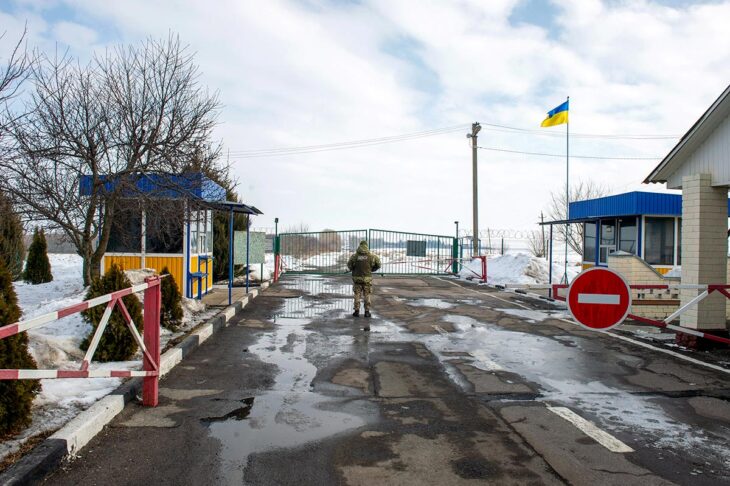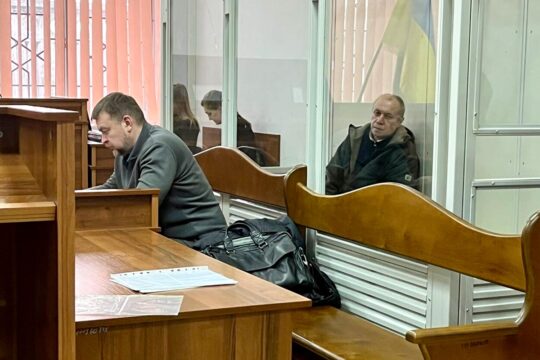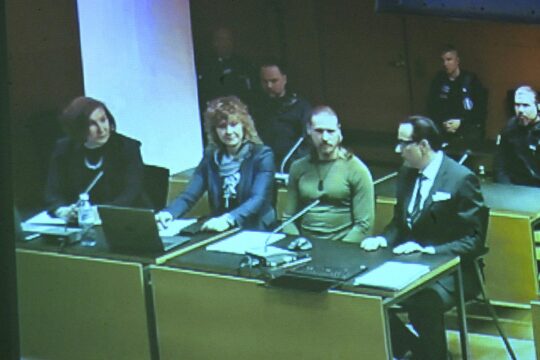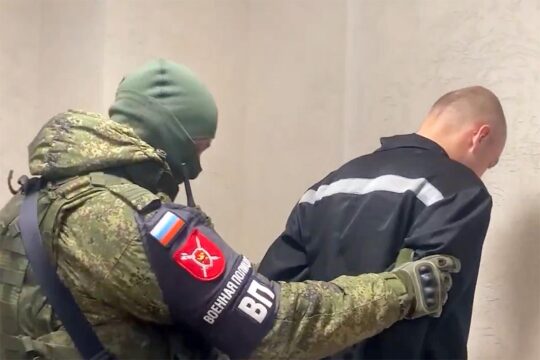In Sumy, North-East of Ukraine, the Zarichnyi District Court is trying the case of Oleksandr Ghen, former head of the Seredyno-Buda territorial community. Seredyno-Buda is a small town in the Shostka district at the very border with Russia. Ghen was elected mayor in 2020. He was a candidate from the Nash Krai (Our Region) party, led by former Member of Parliament Andrii Derkach whose constituency included Seredyno-Buda. Ukraine’s intelligence services SBU subsequently reported that Derkach was in charge of a network of agents in Ukraine for the Russian Army General Staff, who were supposed to help the enemy seize power. According to the prosecution, Ghen sided with the enemy during the war and organized an illegal cross-border transfer of people.
Ghen was arrested on April 29, 2022. The case has been in court since last November. However, 18 out of 21 members of the Seredyno-Buda City Council signed a positive recommendation for Ghen, which was submitted to the court.
Initially, Ghen, as former head of the Regional Territorial Community was imposed pre-trial detention with the possibility of bail in the amount of almost 1,5 million hryvnias (about 37,000 euros). But this decision was opposed by the former head of the Sumy Regional Military Administration, Dmytro Zhyvytskyi, and local activists. Judge Oleksiy Sybilov, who had imposed this measure of restraint, reportedly received threats. In May, the Sumy Appeal Court overturned the previous decision and imposed detention without bail due to a significant violation of the criminal procedure (under martial law, a judge has the right not to set bail in criminal proceedings for treason).
"My platoon was destroyed, and here the checkpoint was wide open"
According to one of the witnesses, after the full-scale Russian invasion on February 24, 2022, Ghen announced that the power in the community had changed from Ukrainian to Russian. He also organized a meeting of the locals and urged them to surrender their weapons. Military man ‘Volodymyr’ (his full name is not given for security considerations) told the court that after March 4, 2022, he came to the meeting to ask the mayor to open the bomb shelters. When he approached, he heard Ghen telling people to bring any weapon they had and hand them over to the police. Ghen denies it, saying that he didn't say anything about weapons, but only suggested that people gather near the police station to figure out what to do next.
During the Russian occupation that lasted until April 2022, residents of Seredyno-Buda were allowed to travel freely to Russia. Ghen also allegedly organized an unobstructed corridor to the aggressor country in order to transport fuel. The witness said that the checkpoint was left open and that he had seen it repeatedly. He said he reported it to the police, but was told "It's none of our business, we were told to stay out of it."
"As we drove closer, they [Ukrainian guards] run away from the checkpoint. They would shout: "Territorial defense! [from] Shostka!" They would go back and forth. The Russians would go over here, the local people would go over there," said Volodymyr. The witness believes that this happened on Ghen's instructions, although he knows this from other people's words and cannot confirm it personally.
"In what role were you in Seredyno-Buda and did you perform any actions at the checkpoint? Were you authorized?" the accused asked, using his right to address the witness directly.
"I had no authority, but as a military man, when a checkpoint with the aggressor country was open, I simply couldn't tolerate it. My platoon was destroyed, and here the checkpoint was wide open. My machine gunner worked for two hours and was brought back as a "200" [meaning dead], and here they go back and forth. I didn't arrest anyone, I would just come and call the police," the witness said.
"Who was your immediate superior? [Someone from] Shostkinsky?" the accused asked.
"I have my superior in Sumy, a brigade commander."
"Did he give you any instructions for your actions?"
"He told me to call 102. He said "Do what you can."
“Who gave you the right to piss off the Russian National Guard?"
Volodymyr's sister is also a military officer. She filmed people crossing the border with Russia without any difficulties. "I received a call and was told that the checkpoint had been opened by order of Mayor Oleksandr Ghen. For me, as a military officer, it was a shock. I arrived in Seredyno-Buda from Shostka two weeks later and saw with my own eyes that the checkpoint was open, and subversive groups were crossing freely. The Russian Guard was also operating there," the woman said.
After February 24, as she explained, there were no Ukrainian border guards at the checkpoint, they were ordered to withdraw to other positions. "On March 29, I was on combat duty in Shostka. A man dressed as a civilian approached me, introduced himself as a senior officer and asked who gave me the right to come to Seredyno-Buda in uniform and "piss off the Russian Guard" with my appearance. I asked him what he meant by “piss off the Russian Guard” and what the Russian Guard even was. I thought the man had misspoken, but he hadn't. I asked: "Are you with Ghen?" He said "Yes". I asked: "Did he and you jointly decide that I shouldn't be there?" He said "Yes". Five people heard this. He named Ghen," the witness recalled.
"Do you think this was part of the plan - not to appear in Ukrainian uniform and not to irritate the Russians, not to cause unnecessary shooting or anything else? Irritate in the sense that you could have provoked them," the accused asked the witness.
"I don't think so. I am a citizen of Ukraine, I wear a military uniform. I took an oath."
The court examined the videos filmed by witnesses on their mobile phones. The footage shows people sitting at the checkpoint, transporting things on bicycles and cars, and when they see that they are being filmed, they turn away.
“The best among all the heads of territorial communities”
Viktor Hubenko, the head of the Shostka District State Administration, was also interrogated in court. He was the one who received the reports from the heads of the districts' communities. "After 11 o'clock on February 24, we were in the enemy's deep rear. I asked the heads of the communities in the WhatsApp group to inform me about the approach of the aggressors, their entry into the communities and their actions. Everyone reported on the movements of the Russians. Before the invasion, Ghen and I did not have very good communication. After the invasion, he was the best among all the heads of territorial communities. His reporting was almost the best," said Hubenko.
The witness cannot confirm whether Ghen provided all the information. However, he said that during their communication, Ghen's attitude was pro-Ukrainian and the witness was unaware of any cooperation with the occupiers.
"On February 25-26, Ghen reported on the arrival of the Armed Forces of the Russian Federation, they pushed apart the concrete blocks at this checkpoint and said that a bus would be provided for residents so that they could travel to Russia for food and to the pharmacy without restrictions. I replied not to allow such possibilities," said Hubenko.
"Do you confirm that Oleksandr Ghen informed you about his communication with the Russians?" the prosecutor asked.
"Yes."
"Do you know what Ghen was talking about with representatives of the aggressor country?"
"Ghen said that the aggressor would not obstruct people from going there [to Russia]."
Border communications
The first deputy head of the Shostka District State Administration, Oksana Tarasyuk, testified that in the first days of the invasion she advised the mayor to seek guidance from the head of the Sumy Regional Military Administration. In a phone conversation with her, Ghen said he spoke to the head of the administration of the Russian border town of Suzemka. He said the Russians assured him that everything would be calm in Seredyno-Buda and that its residents could access Suzemka freely. Tarasyuk, hearing this, replied to Ghen that this was “improper".
On June 23, the prosecutor once again requested the extension of Ghen's preventive detention. He justified it by stating that Ghen lives near the Russian border and has close ties with the Russian authorities. Therefore, he could hide, influence witnesses or continue to commit criminal offenses. The defense lawyer, on the other hand, asked for a personal commitment and said that the suspicion against his client was unjustified. Ghen has no previous convictions, has not evaded the investigation, has a positive personal record and a third-degree disability. Nevertheless, the court granted the prosecutor's request and ordered Ghen to be held in custody until August 21. If found guilty, Ghen could face 15 years to life in prison with confiscation of property.
This report is part of our coverage of war crimes justice produced in partnership with Ukrainian journalists. A first version of this article was published on the "Sudovyi Reporter" website.







